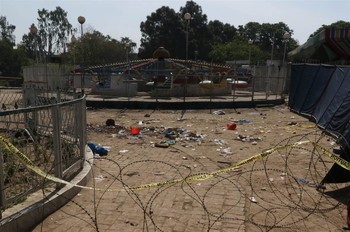A Sunday afternoon blast ripped through a crowded park in Lahore, Pakistan, killing at least 70 and wounding more than 300 people. Pakistani Taliban splinter group, Jamaat-ul-Ahrar, claimed responsibility for the suicide bombing it says targeted Christians celebrating Easter at the amusement park, although most of those killed, including 29 children, were Muslim.
Veda Gill, executive director of Presbyterian Church (U.S.A.) partner, the Presbyterian Education Board in Pakistan, sent a note to friends and supporters of the organization earlier this week. “We celebrated Easter with a sunrise service and then a worship service at 10:30 am,” she said. “The churches were all jam packed. The State provided us with police security. We were all so thankful to God for His safety ... until it was 6.30 pm.”
That’s when a suicide bomber walked into the Gulshan-i-Iqbal park, or Garden of Iqbal, and detonated himself in close proximity to children’s carnival rides. The park was teeming with families enjoying picnics and the Easter holiday. Gulshan-i-Iqbal is named after Sir Muhammed Iqbal, a prominent Pakistani poet and philosopher who died in Lahore in 1938.
“My family and I were at our home when this tragedy occurred,” Gill continued. “Our house was packed with my husband’s four sisters, their husbands, and some of their children who had come from America to attend a wedding when we heard a big blast.”
Gill said the park is only a five-minute walk from her home and is on the path she and her husband frequently walk. “This is the place where I took my granddaughter every other day when they were in Pakistan for Christmas,” she said. “This park attracts children because it has many different kinds of swings as well as many varieties of birds and animals. This is the park where poor Christians and Muslims come to celebrate, as many rides are free. On Easter and Christmas we see a lot of Christians there.”
Dr. Jim Tebbe, rector of Forman Christian College, another PC(USA) partner in Lahore, also sent an update, saying, “None of the staff, faculty or students that we know of were killed or injured in the attack. We understand that some relatives (4-5) of our staff were killed.”
The school is located only two miles from the site of the blast and has implemented enhanced security measures over the past year in response to safety concerns.
“Everyone who comes on campus has a proximity identification card with biometric access,” said Tebbe in his message to supporters of the school. “There are 130 guards on campus, mostly ex-military. We have armed observation posts and anti-terrorist police assigned to guard the campus… We have roving guard patrols on bicycles. There is an emergency siren alarm with a notification system that can inform those on campus what to do in case of an event or emergency. Many parents send their children to us because they feel we are safe.”
The Pakistani government has called for three days of official mourning in light of the attack and an intensive search is currently underway looking for suspects and collaborators in the bombing. Current estimates are that 200 people have been detained in this search.
Al-Jazeera reported Monday that Lahore police had identified 14 of those killed as Christians, though final determinations of identity were ongoing. Christians make up approximately 1.6 percent of the Pakistani population, the second largest minority religious group in Pakistan behind Hindus.
Jamaat-ul-Ahrar, the group claiming responsibility for the attack, has previously aligned itself with the Islamic State of Iraq and the Levant (ISIL, also known as ISIS) group. The bombing marked Pakistan's deadliest attack since the December 2014 massacre of more than 130 school children at a military-run academy in the city of Peshawar.
Recent acts of violence in Pakistan, specifically targeting Christians, include:
- Two bomb blasts at churches in Lahore in March 2015 that killed 14 and injured more than 70 people.
- A twin suicide bomb attack at a Peshawar church in 2013 killed 80 people.
- Forty homes and a church were set ablaze by a mob in Gojra in 2009. Eight people burned alive.
- In 2005, hundreds fled their homes in Faisalabad as churches and Christian schools were set on fire by a mob, after a resident was blamed for burning pages of the Koran.
“This is a difficult time for us all,” Gill said in conclusion. “Many of our Christian brothers and sisters have lost their near and dear ones. A Christian family came with five children and three died in the blast. My immediate family is safe but this incident has really shaken us. We strongly believe that there is a day to die. We are not going to die of fear every day. Life goes on with HOPE, TRUST, AND FAITH IN THE LORD.
“Please pray for Pakistan and also for Christians in Pakistan.”
Tebbe also asked for prayers, saying, “Do pray for [God’s] protection for us, but please don’t forget to pray for the victims’ families and for the government which is sincerely trying its best to stop the terrorists.”
“This recent attack is heartbreaking to say the least,” said the Rev. Mienda Uriarte, Presbyterian World Mission area coordinator for Asia and the Pacific. “The community of faith is in pain as lives are shattered, traumatized, and forever changed. We stand with sisters and brothers of all faiths and pray for a day when God’s shalom will finally be our way of life.”
-----
Presbyterian World Mission supports the work of these and other partners in Pakistan.
Presbyterian Church (U.S.A.) leaders issued a prayer for the people of Pakistan yesterday.

